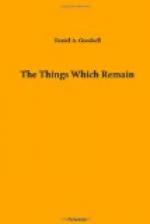“The life everlasting!” This is the grand finale of the Creed as it is the end which all devout souls seek. It is made probable by what man is, which is the same as saying that there are, from considerations above mentioned, probabilities in its favor. It has been the habit of pious souls to attempt to understand and describe this life, and many are the volumes which proceed upon the literalness of the Bible descriptions. I suppose there are phases of faith which can not reach beyond literalness, and hence do not rightly interpret the splendid imagery of St. John. Such we must leave to the blessed surprise and ecstatic awakening of Paradise.
[Sidenote: Great Figures.]
[Sidenote: Locating Heaven.]
[Sidenote: Eternal Punishment.]
To other minds the life everlasting is unbelievable except as the great pictures of John are spiritualized. To such the place becomes a state or condition. It is of no interest to us to inquire, as did the Christian philosopher, Dick, into the locality of heaven and hell. Such ideas as those recently put forth by a preacher, not of our Church, thank God! that hell is in one of the spots on the sun, and heaven in the chromosphere are distasteful to the last degree to those who believe that “God is a Spirit,” and that “flesh and blood can not inherit the kingdom of God.” Such feel that heaven may be anywhere and everywhere; that the gulf which separates the rich man and Lazarus may be only a moral gulf, seeing that they talked across it. They see eternal punishment in the perception of the sinner that he has forever stunted his soul by his sinfullness and the grossness of his affections. Though he should begin a progressive life from his present status, he could never catch up with a soul which has a purer point of departure.
There is an awful penalty in the fact that this sense of loss may be eternal. The consciousness of limited powers, the certainty that so much is lost, never to be regained, is surely a fire that is not quenched; a worm that dieth not!
[Sidenote: Limitation by Sin.]
[Sidenote: Illustrations.]
[Sidenote: Strength and Disuse.]
But how much more awful the thought that this limitation of the nature by sin, whether of body or soul, may affect the soul through unending life without fitness for any pleasure or delight possible to that state! The company of good and refined men and women is here little less than hell to a bad and coarse man, if he is compelled to stay in it. There is nothing in the spirit, aim, and employments of such that he can measure. He can understand the delights of eating and drinking. Even then it is the coarse foods and the drunk-bringing drink that he most enjoys. He can understand noise, coarse jokes, but not quiet conversation, nor the play of a delicate wit. When the pleasure of life is sensual, bodily, the capacity for mental and moral pleasure slowly diminishes, and at last dies. Project such a soul into the company of the redeemed; place it where the body has no existence, and therefore no pleasure to give; compel it to remain among those whose every thought is pure, and whose eyes are fixed on the “King in His beauty,” and, like the rich man, it will lift its eyes in torment, and ask for “water to cool his parched tongue.”




